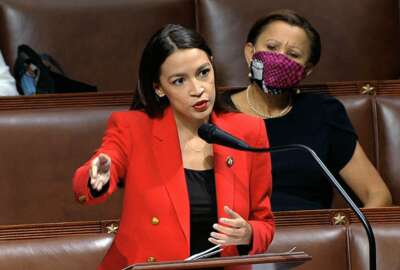To listen to the Federal Newscast on your phone or mobile device, subscribe in PodcastOne or Apple Podcasts. The best listening experience on desktop can be found using Chrome, Firefox or Safari.
- Top Republicans on the House Financial Services and Oversight and Reform Committees tell the Postal Service to rethink plans to offer more banking services. Reps. Patrick McHenry (R-N.C.) and James Comer (R-Kent.) said Postmaster General Louis DeJoy didn’t loop them into plans to launch a check-cashing pilot at four post offices last month. The lawmakers said postal banking goes beyond the agency’s core mission, and expect a USPS briefing on plans for the pilot before the end of the month.
- It’s up to federal contractors to decide how they’ll handle employee medical or religious exceptions to the vaccine mandate. The Biden administration said federal contractors should decide how they’ll grant accommodations to their own employees. They should also set a timeline for their employees to get vaccinated if they don’t receive an accommodation. The administration reiterated contractors who previously had COVID-19 should still be fully vaccinated by the December deadline. Per CDC guidance, contractors who recently had the virus can wait longer to get the shot.
- Federal contractors need to abide by the Biden Administration’s vaccine mandate, even if they’re nontraditional vendors working under Other Transaction Agreements. It’s very rare for the Pentagon to require specific language in OTAs, since they’re designed to attract new vendors by offering more flexible terms. But a DoD memo said agreements officers must require most companies working under OTAs to follow the Safer Federal Workforce Task Force’s COVID protocols. The requirements apply to OTAs worth $250,000 or more. They’ll affect any OTAs the military signs after November 14, and in some cases, even earlier.
- Congress is concerned about how the Defense Department is moving forward with space acquisition. The creation of the Space Force was supposed to centralize the procurement of space weapons. However, members of the Senate Appropriations Committee say they are concerned at how slowly DoD is consolidating its space acquisition offices. The committee is asking for a report from the Pentagon identifying space procurement and development programs. (Federal News Network)
- U.S. counterintelligence officials want to work more closely with key industries. The National Counterintelligence and Security Center is prioritizing outreach efforts to a select few technology sectors that officials believe are crucial to U.S. economic and national security. The focus is on artificial intelligence, biotechnology, autonomous systems, quantum computing and semiconductors. NCSC said it wants to make companies working on those technologies aware of challenges from foreign intelligence threats and steps it can take to stop them.
- President Biden’s nominees for the Federal Labor Relations Authority said tackling the backlog of unfair labor practice complaints is their top priority. FLRA has a backlog of roughly 275 pending cases. The authority can’t enforce or weigh in on those agency and union disputes without a general counsel. Kurt Rumsfeld is the president’s pick to be FLRA general counsel. He said he’d use tactics the authority deployed to address past backlogs. The FLRA hasn’t had a general counsel for over four years. (Federal News Network)
- The Biden administration sets up another busy year for chief data officers. The Federal Data Strategy’s 2021 action plan directs agencies to focus on cross-cutting work like accelerating developments in artificial intelligence, using government data to stem wildfires and building up data skills within the federal workforce. It directs the CDO Council with creating a data-skills workforce development playbook to help agencies stand up training programs. It also notes the Office of Personnel Management expects to complete a data science job series later this year. (Federal News Network)
- The Pentagon’s inspector general found there was nothing improper about the appointing of the National Security Agency’s top lawyer last fall. In a newly released report, the IG concluded that the Trump White House did not pressure the Pentagon to select Michael Ellis to serve as NSA general counsel in late 2020. The IG also found the NSA did nothing wrong when it later placed Ellis on administrative leave for allegedly mishandling classified information. Ellis ultimately resigned from his post in April.
- A new study is casting doubt on a plan that would move TRICARE recipients away from military health facilities. A Defense Department funded report said that moving TRICARE beneficiaries away from military hospitals and clinics would cause increased mortality and lower patient safety. That’s because those patients are getting better care from military facilities. Congress mandated that DoD downsize its hospital system in 2016. The plan would close 50 facilities and move 200,000 people into civilian care. The Defense Health Agency has been rethinking the plan after seeing how the coronavirus pandemic stressed civilian hospitals. (Federal News Network)
- Under a bill passed by the House, the Commerce Department would lead a new supply chain security effort around information and communications technologies. The ICT Strategy Act would require an analysis of the competitive state of U.S. companies and recommendations for how agencies could address any competitive barriers. The strategy and recommendations would also include input from DHS, the FCC, the Justice Department and the Intelligence Community as well as trusted ICT vendors. There is no companion bill in the Senate, however.
- GSA is facing new pressures about recent cloud services efforts. Two industry associations are raising concerns about two separate cloud computing issues from the General Services Administration. The Coalition for Government Procurement wrote to GSA about its plans to create a blanket purchase agreement for cloud services. It said this generic governmentwide vehicle may be duplicative and wasteful. Meanwhile, CompTIA wrote to GSA regarding public comments made by officials during a recent industry day. CompTIA is concerned that GSA is promoting ideas that justify vendor lock-in and anti-competitive actions. Both associations are trying to get ahead of potential problems. (Federal News Network)
Copyright
© 2025 Federal News Network. All rights reserved. This website is not intended for users located within the European Economic Area.




